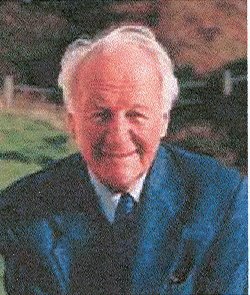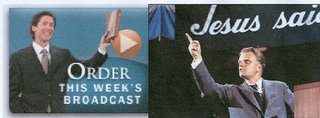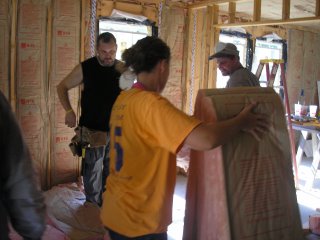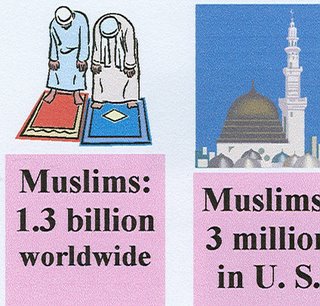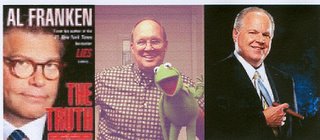
Relief: TAXES or CHARITY
October 1, 2005
· In the words of Mother Teresa:
· “People are unreasonable, illogical and self-centered; LOVE THEM ANYWAY.
· If you do good, people will accuse you of selfish ulterior motives; DO GOOD ANYWAY.
· If you are successful you win false friends and true enemies; SUCCEED ANYWAY.
· The good you do will be forgotten tomorrow; DO GOOD ANYWAY.
· What you spent years building may be destroyed overnight; BUILD ANYWAY.
· People really need help but attack you if you help them; HELP PEOPLE ANYWAY.
· Give the world the best that you have and you’ll get kicked in the teeth; GIVE THE WORLD THE BEST YOU’VE GOT ANYWAY.”
How all the natural-disasters-relief expenses unfold will be one of the most important issues this nation has ever faced. Leave blame behind, nothing will compare to the potential consequences for recovery capital to put communities back together.
Of recent weeks there have been negative voices to the effect that many of the affected people do not deserve a helping hand. Some of these cynical views have been in e-mails, and some have even been fictitious messages (e-rumors) propagating humanity in a depraved condition. In our churches we work generously without judgment of worthiness to aid all people.
Just how extensive and what should the role of faith people be in providing for immediate relief, but even more to the reestablishment of communities? Or do you think it is for the most part government’s responsibility? $250 billion – and more! Should government step aside for private enterprise alone to rebuild? For whatever out government’s role, is it willing to take responsible action now to pay through additional revenue and spending cuts – not to further bankrupt our treasure and put the financial burden on the backs of our children and their children? Regardless of who pays, if it’s government or charities, accountability is imperative. For government’s role, this is an initiative coming from Senators Tom Coburn, an Oklahoma Republican, and Barack Obama, Democrat of Illinois, who have called for a chief financial officer to review expenditures before the money is spent, rather than more inspectors general to audit records after the fact.
We could forgo government’s aid for recovery by putting into practice the commands of our Christian Faith – to be servants. That’s not such a ludicrous statement! Certainly it’s not illogical, if Christians were to fulfill The Great Commission. The 76% Christian population in the US and other aid that might come from outside, could totally pay for the recovery. But will the Mother Teresa’s step forth?
As some have suggested, God is in control by allowing devastation on sinful humanity (I don’t believe that.), God may as well be testing our Christian response to fill the needs of deprived humanity. That includes our responsibility with other deprived third-world countries where hunger and disease are rampant – not to mention the scourge of genocide. My friend Richard, a retired UMC minister, says, “I believe charity begins at home, however according to John Wesley "The World is my Parrish". It seems to me that it becomes a both/and not an either/or.” Perhaps it begins at home because that’s where we can more readily be effective, one on one. In far off lands the individual’s resource become more difficult to apply, except through a collective voice or financial support of an organization, such as the United Methodist Committee on Relief. Additionally, The Salvation Army in its William Booth design is one of the most effective world wide in relief – to serve those of the least of us. (I have attached herewith an article, from Wall Street Journal’s 9-29-05 edition, highlighting the Army’s relief work in the Gulf area, which also describes difficulties of Red Cross. Please understand this inclusion is in no way to put down the RC. I have known people who admirably work for RC and I know it plays a very important role.)
At my church service last Sunday, our preacher said, “Christianity is not a “religion”; it’s a relationship with God through Jesus Christ.”
Unequivocally, Jesus did practice a relationship with God by tending to the sheep, serving mankind. He was SERVANT. He expressed that “God is Love” through the indisputable practice of His service and compassion to the “least of those among the flock”. Jesus did say in Mark 12: 29th “The first of all the commandments is: ‘Hear, O Israel, the Lord our God, the Lord is one. 30 And you shall love the Lord your God with all your heart, with all your soul, with all your mind, and with all your strength.’ This is the first commandment. 31 And the second, like it, is this: ‘You shall love your neighbor as yourself.’ There is no other commandment greater than these.” Luke 6: 27 “But I say to you who hear: Love your enemies, do good to those who hate you, 28 bless those who curse you, and pray for those who spitefully use you. 29 To him who strikes you on the one cheek, offer the other also. And from him who takes away your cloak, do not withhold your tunic either. 30 Give to everyone who asks of you. And from him who takes away your goods do not ask them back. 31 And just as you want men to do to you, you also do to them likewise.” Jesus does not stop here; He continues the exhortation of His “Rules of Kingdom Life.” These are hard words, and I dare say few Christians, including fundamentalists who say they believe in literal interpretation, make a serious attempt to live by them.
In light of the recent scourge of humanity wrought by recent natural disasters, not to mention starvation and genocide in other parts of the world, will we endeavor to be more than a token for Jesus’ Kingdom here on earth? If we “love our neighbor as our self” (And we can only love God if we do love our neighbor as ourself.) it does require more than just the lip service or a token: “I believe in Jesus as my Lord and Savior, and if you’ll do the same everything will be ok.”
Albert Nolan (who would make the case that scriptures support Jesus’ intent for His ministry to be more an implementation of service and compassion for neighbor than a true doctrine) in his book Jesus before Christianity:
· “He himself (Jesus) did not regard the truth as something we simply ‘uphold’ and ‘maintain’, but something we choose to live and experience. So that our search, like his search, is primarily a search for orthopraxis (true practice) rather than orthodoxy (true doctrine). Only a true practice of the faith can verify what we believe.” “Jesus can help us to understand the voice of Truth but, in the last analysis, it is we who must decide and act.”
“God is still speaking” is the sign I saw at the entrance of a United Church of Christ recently. If God is still speaking, will God speak through righteous acts of good deeds we uphold in our relationship with God through Jesus in His “Rules of Kingdom Life” here and now --- or will we concede government’s further financial-hole digging? What’s better: to pay in taxes or charity? Will enough Mother Teresas come forth with hands of love and purses open?
Thanks to everyone who supports “those of the least of us.”
‘’’’’’’’’’’’’’’’’’’’’’’’’’’’’’’’’’’’’’’’’’’’’’’’’’’’’’’’’’’’’’’’’’’’’’’’’’’’’’’’’’’’’’’’’’
In a related article: Church Must Reclaim Mandate to Provide for the Needy
http://headlines.agapepress.org/archive/9/272005d.asp· Excerpt: We have to raise up people to understand that government cannot protect them," Daubenmire says. In fact, the former high school coach contends, "It's not the role of government to protect them, and it's time for the Church to reclaim the job that we've been mandated to do -- to feed the hungry and to clothe the naked and to reach out to those that are hurting. Those are Christ-ordained mandates that the Church must do, and we want to help wean people off of federal government."
‘’’’’’’’’’’’’’’’’’’’’’’’’’’’’’’’’’’’’’’’’’’’’’’’’’’’’’’’’’’’’’’’’’’’’’’’’’’’’’’’’’’’’’’’’’’’’’’’’’’’’’’’’
THE WALL STREET JOURNAL - SEPTEMBER 29, 2005
Along Battered Gulf, Katrina Aid Stirs Unintended Rivalry
Salvation Army Wins Hearts, Red Cross Faces Critics;
Two Different Missions
By CHAD TERHUNE
Staff Reporter of THE WALL STREET JOURNAL
September 29, 2005; Page A1
EAST BILOXI, Miss.-- The town hall meeting last week started like a church revival, with more than 200 Katrina survivors singing "Amazing Grace" under a big red tent on a football field here.
The opening prayer asked the Lord to strengthen hands, feet and minds for the rebuilding ahead. Then city officials and residents counted their blessings, thanking the dozens of volunteers who had arrived here after the storm and the donors who had sent money and supplies. People in the crowd saved their biggest applause for the Salvation Army.
[Eula Crowell]" They were the only ones here in the beginning," Eula Crowell, 57 years old, said after the meeting. She lost her house to the massive storm surge that inundated East Biloxi, where many of the city’s poorest people live. For the past month, she has relied on the Salvation Army for water, hot meals, groceries and other basic goods. The group also gave her $50.
The Salvation Army has the biggest presence among the nonprofit groups and churches helping out at East Biloxi's Yankie Stadium, the hub of local relief efforts. Volunteers live in tents on the football field -- "Camp Bayou," as some call it. In the parking lot, volunteers unload pallets of water, apple juice, canned goods and diapers. Last week, the Salvation Army began passing out boxes of cleaning supplies.
The American Red Cross was mentioned at the meeting too, but in a different way. "We want to know where the money is," Ms. Crowell said when she cornered a Red Cross official who attended the gathering. "All these people across America are giving money over the TV. I would tell them to put it back in their pocket."
Across the hurricane disaster zone, stretching from Alabama to Texas, an unexpected and unintended rivalry has developed between the two nonprofit organizations most closely associated with the aftermath of calamity. Here in some of the poorest parts of Mississippi and much of the Gulf Coast, the Salvation Army is drawing praise for its swift arrival in the most distressed areas and clearly winning the hearts of desperate residents. To some people here, the Red Cross, under growing criticism for letting bureaucratic hurdles slow down aid in the disaster area, suffers by comparison.
The Salvation Army is helped by its military-style structure, which is designed for rapid mobilization and which puts a premium on training people in advance to deal with disasters. It can draw on more than 65,000 employees in the U.S., nearly double the paid staff of the Red Cross.
The Salvation Army's daily work in permanent shelters with the homeless and poor and with people trying to put their lives back together after an apartment fire or years of alcohol and drug abuse helps too. The organization’s focus on alleviating human suffering in the name of Jesus Christ resonates in this section of the Bible Belt.
Lightning Rod
The Red Cross, the world's dominant relief group, is naturally a lightning rod for criticism. Among aid groups, it stands out for its international reach, breadth of services and fund-raising prowess. The organization has raised nearly $1 billion in donations since Katrina hit, representing about seven of every 10 dollars given for hurricane relief, according to the Chronicle of Philanthropy.
The Red Cross has been more ambitious than any other organization in the Katrina aftermath, dispatching 163,000 staff and volunteers to shelters and aid centers. Many are volunteers working in a disaster for the first time and armed with only a few hours of training. Several volunteers at the Baton Rouge River Center, one of the largest Red Cross shelters, quit over the disorganization they saw there. Others were sent home early because they couldn't handle the work emotionally, according to volunteers there.
Charlotte McGee of Harvey, La., has slept in the Baton Rouge River Center auditorium for three weeks along with four daughters and four grandchildren. "Everyone in here I talk to is complaining about the same things. These volunteers just treat us like crap," Ms. McGee said. "We don't want to be here, either, but if you didn't volunteer for the right reasons, then go back home."
Only people living at the Baton Rouge shelter could apply for emergency financial aid there. Volunteers say that rule frustrated many other storm victims who walked in seeking help and got a flier instead urging them to keep calling a busy toll-free number. The Red Cross pays out $360 for a single person to $1,565 for a family of five or more.
The Red Cross acknowledges that its phone lines have been overwhelmed. It is expanding its phone bank operations, hoping to process up to 40,000 financial-aid claims per day.
A spokeswoman for the Red Cross says the disaster is so massive that complaints and glitches are inevitable. And with more than 100,000 volunteers in the field, some inevitably won't be up to the job. "We were challenged like never before" by Katrina, said Devorah Goldburg, spokeswoman for the Red Cross in Washington. "I think we rose to the challenge. We know we are not perfect. We are asking people to be patient with us."
Lisa Burbridge, an East Biloxi resident whose home was flooded, said she had no luck over the phone so she waited more than five hours at a Red Cross financial-assistance center on Saturday, Sept. 17. But it never opened that day. Late that evening, a police officer got on a bullhorn and told people waiting to go home empty-handed. "There is no organization from the Red Cross," said Ms. Burbridge. She has depended on groceries and other donated goods from the Salvation Army for the past month. "Thank God for them."
Both the Salvation Army and the Red Cross say they don't see themselves in competition and that the need for hurricane relief far surpasses the capability of any one organization. Salvation Army officials declined to comment on the Red Cross at all. Ms. Goldburg of the Red Cross said: "We think it's great the Salvation Army is out there. ...Our missions are a little bit different."
No one doubts that the Red Cross has touched many lives for the good in recent weeks. This past weekend, the organization housed 120,000 people in nearly 500 shelters across the country, split about evenly between people who evacuated for Katrina and Rita. The Red Cross is housing another 300,000 in hotels and has given 530,000 families some form of financial assistance.
The Salvation Army, founded in 1865 in London and best known for its bell-ringing Santas soliciting donations to red kettles outside stores between Thanksgiving and Christmas, is both an evangelical Christian church and a major relief agency. It adopted a quasi military command structure in 1878, and today it still uses uniforms and military ranks for its 3,700 "officers," who are also ordained ministers. It has an additional 62,000 employees at its 9,000 Salvation Army centers around the country, which usually hold weekly worship services.
Tight Budget
Outside management experts have credited the Salvation Army with operating efficiently on a tight budget. That reputation has served it well as it took on a larger and larger role in disaster response since Hurricane Andrew in 1992 and the Northridge, Calif., earthquake two years later. Now that immediate assistance has been given, Salvation Army employees are beginning to work with residents on their long-term needs for housing, furniture, employment and help with utility bills and other financial issues.
"We do this extremely well because we are already there 365 days a year serving the poorest of the poor in these communities," said Maj. George Hood, national community relations secretary for the Salvation Army. "We are serving many of the same clients, but now they don't have homes."
The Salvation Army estimates it has helped about 500,000 storm victims in the past month by serving 4.3 million meals and handing out groceries, store vouchers, mops and buckets and other essential goods. It has rotated a team of about 12,000 employees and 28,000 volunteers into the field on two-week stints, drawing on donations of $185 million so far.
No Transportation
In East Biloxi, where many of the African-American, Hispanic and Vietnamese families had no cars or lost them in the storm, Ms. Crowell said she had no transportation to reach the closest Red Cross financial-aid center about 10 miles away. Many of the roads remain impassable, and traffic is painfully slow.
Brian Fern, an American Red Cross official on assignment from Muncie, Ind., looked Ms. Crowell in the eye after the town hall meeting and said, "I understand ma'am. We are stretched. We are stretched. We will have a site in East Biloxi soon. But I don't know where yet."
Frustrated that the Red Cross hadn't shown up, local math teacher Susan Turner took matters into her own hands. She became a Red Cross volunteer and began taking down people's information for cash payments under a small white tent in East Biloxi. "The Red Cross didn't do anything for us. They know they are in trouble just like FEMA [Federal Emergency Management Agency],” Ms. Turner said.
Late last week, nearly 100 people waited on folding chairs for their turn to apply for cash grants. Ms. Turner drives the paperwork each afternoon to the closest Red Cross center and retrieves the checks about two days later. She began passing out some of the first checks over the weekend.
Daniel Jackson, 59, was grateful Ms. Turner was there to fill out his application. He was set to receive $965. "We lost everything we got," said Mr. Jackson. His car was destroyed by the flooding. He says he needs money to pay his bills and to buy clothes for his 16-year-old daughter and himself. His wife is in a Biloxi hospital with lung cancer.
The Red Cross says it has struggled to have a presence in some of the hardest-hit areas because there are few buildings left standing with adequate space and parking for the large number of storm victims expected to show up. That was the challenge in East Biloxi.
"We are not in every neighborhood we need to be. We are in every neighborhood we can be," said Laura Howe, a spokeswoman for the Red Cross in Mississippi.
This week, a month after Katrina flattened most of East Biloxi, the Red Cross hoped to finally open a financial-aid center here. But the opening has been delayed.

